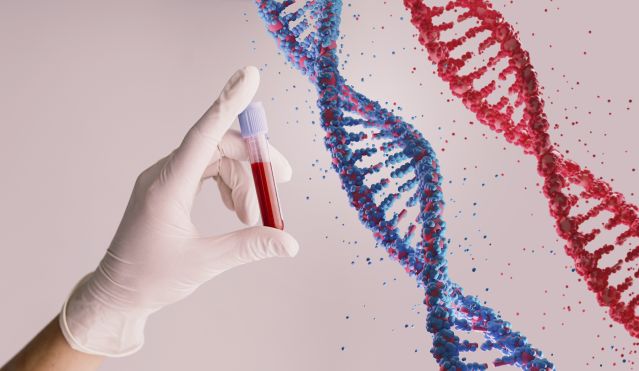Genetics
5 Reasons Why We Need to Talk About Genetics
Can genetics help us make better decisions?
Updated March 6, 2024 Reviewed by Abigail Fagan
Key points
- Millions of people have had their genome sequenced to learn about their genetic ancestry and health risks.
- Knowledge about our genomes can empower us, but it also comes with the threat of genetic discrimination.
- We should aim to maximise its benefits in non-discriminatory, democratic, and fair ways.

By Sophie von Stumm
The 20th century was dubbed ‘the century of the gene’. You could say it started with the coining of the word ‘gene’ in 1903. Fifty years later, James Watson and Francis Crick used Rosalind Franklin’s X-ray diffraction images to describe the double-helix structure of DNA, short for deoxyribonucleic acid. After another 50 years, in 2003, the sequence of all genetic variants in the human genome had been mapped. In 2008, Time Magazine crowned the at-home DNA kit — a plastic receptacle that you spit in at home and then mail off — ‘Invention of the Year’. By the end of 2021, more than 30 million people had ordered such a kit: They had paid to have their DNA genotyped and interpreted.
Reason 1: DNA is everywhere.
Today, the number of customers of genetic testing services likely exceeds 60 million people. Genomic data feature in all areas of life: They inform clinical diagnoses and disease treatments just as much as they help ensure the compatibility of reality TV couples (yes, ‘Married at First Sight’ used ‘DNA matching techniques’). Before the rise of Ozempic, ‘personalized nutrition’ based on your DNA was the go-to miracle cure for dietary and weight problems. This is the first reason why we need to talk about genetics: DNA is everywhere.
Reason 2: Genetics are probabilistic, not deterministic.
People, who are turning an at-home DNA kit over in their hands usually ponder one of two interferences to their mental felicitousness. The first is paralysis, from the fear that behaving one way or another will trigger their genetic risk into a phenotypic reality (usually a nasty illness that nobody wants). Will I chastise myself for every glass of wine, for every sugary dessert, for every hour not spent exercising in fresh air when I know my high risk for dementia? Knowledge can empower us, but — as Adam and Eve, the original ancestors of some, famously demonstrated — it can also render us stiff lumps of shame, guilt, and fear.
The other challenge is the self-fulfilling prophecy. Knowing our genetics may make us behave in the ways that we have been told are the essence of our true self or who we are. If I am told that I am an incorrigible smoker, genetically speaking, what’s the point in fighting the stinky habit? I might as well light up with gusto: After all, it’s just who I am, what my organism wants, what my genes ask for, what I need — at least that’s how genetics can be misinterpreted. Genetics are probabilistic, not deterministic: Carrying DNA variants that make me likely to enjoy cigarettes don’t force me to tar my lungs, even though they probably make it harder for me to quit smoking. This is the second reason why we need to talk about genetics: To work out how can we use knowledge about our genetics productively without freaking ourselves out.
Reason 3: There are no genetic tribes, clans, or races.
The desire to know one’s own genetic ancestry makes many people buy genetic testing services. It is possible to trace the people and geographical locations that a person descended from through matching their genetic variants to those from different reference populations across the world. If a person shares more genetic variants with one reference population, it is likely that they descended from that rather than another reference population. Today’s genetic ancestry models achieve a relatively high resolution: A person’s genome can be parsed into hundreds of regions and populations, and their connections to thousands of ‘genetic relatives’ can be mapped.
Knowing your ancestry responds to our deep-rooted curiosity about where we have come from and what our origins may say about us. Framed in positive ways, it's about finding and celebrating our personal ‘heritage’. Such narratives of our unique genealogies can make us feel special, but they also serve to reinforce the (false) thinking that people can be divided into genetically distinct groups: tribes, clans, races. Such groupings are socially constructed, not genetically, and reflect many complex descriptors of geographical, political, ethnic, and other factors. The incorrect view that humans can be classified into discrete, innate categories has been and sadly continues to be misused to create divisions. This is the third reason why we need to talk about genetics: How we interpret genetics influences how we treat the people whom we share the world with.
Reason 4: The right to ignorance vs the responsibility toward others.

Your genome can tell you about your personal genetic risks for health problems that run in families. Examples are cancer, glaucoma, or dementia. Some people want to know their risk of developing these diseases, for themselves, to plan their lives, to inform their loved ones, and to realise what genetic risks they might pass on to their children. Others squirm at the notion of genetic forecasting. They prefer living without carrying the weight of knowledge about their genetic ailments, however light or heavy these may be. This preference is very understandable — after all, ignorance is bliss — but what if shunning knowledge that is readily available makes others suffer unfavourable outcomes?
Genetic variants are associated with the risk of breast cancer in women but the same variants do not manifest in distinct disease patterns in men. Without having their genome sequenced, men have no idea if and how many of the genetic variants for breast cancer they may carry. Should fathers of daughters be held responsible for having their genomes checked for breast cancer related DNA variants, so they can teach their daughters early on about cancer screening, preventive surgery, and medical choices? Angelina Jolie is likely the most famous woman who chose to undergo preventative surgery to remove her breasts, ovaries, and fallopian tubes, because she has a high genetic risk for cancer, to which she lost her mother, grandmother, and aunt. This is the fourth reason why we need to talk about genetics: The possibility of genetic forecasting forces us to discuss where the right to ignorance ends and the responsibility toward others ends.
Reason 5: The fear of genetic discrimination persists.
Let's stick with the father-daughter example for our last reason why we need to talk about genetics: Should daughters who inherited DNA variants for cancer from their fathers pay more health insurance than other women? Should men who carry DNA variants for breast cancer be prohibited from having daughters or sons?
The leading cause for people to shy away from genetics is the fear of genetic discrimination. Genetic discrimination refers to the unequal treatment of individuals based on their genome, for example on the basis of a heightened genetic risk for developing a disorder. Although laws prohibit genetic discrimination in most countries, the fear that sharing information about one’s genotype will incur disadvantages is widespread. This problem does not have an easy fix: Discrimination, genetic or not, is real, prevalent, and dangerous. Yet, the risk of discrimination neither justifies ignoring genetics nor does it diminish the importance genetics has for our lives. This is the fifth reason why we need to talk about genetics: To learn how we can maximise the benefits of genetic forecasting for everybody, in non-discriminatory, democratic, and fair ways.
Quo vadis?
Genetics has arrived in our day-to-day lives. Millions of people already had their genomes sequenced, and millions more will do so in the future. We must discuss who gets to know about our genomes and to what ends, and we have to make sure that these discussions are open to everybody, circumspect, and considered. In the words of the fearless Marie Curie: “Nothing in life is to be feared, it is only to be understood. Now is the time to understand more, so that we may fear less.” Let’s talk genetics.




